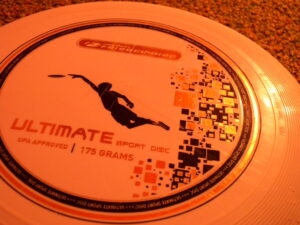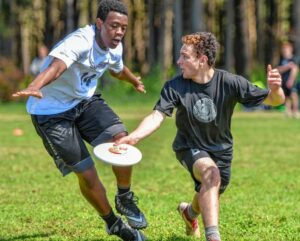Self-Organization, Mutual Support, Mindfulness, Inclusion and Love: The Ultimate Sport for a Better World
June 2, 2022 2 Comments
I love frisbee and have for as long as I can remember. Recently, as I was entering into a few weeks of sabbatical time away from work, a friend asked me what I thought would be most regenerative of my mind, body and spirit during this time. In addition to rest, slowing down, being generally mindful, and taking a break from screens, social media and the news, one of the things that came top of mind was playing frisbee. I have memories of my teenage and twenty-something self in utter bliss and a sense of timelessness, hurling a disk across a vast expanse at a corner lot in our neighborhood in Flint, Michigan or at a lakeside park in upstate New York with my dad or a friend, feeling the breeze, watching the frisbee glide and rotate against a backdrop of brilliant blue sky and feeling the grass massage my bare feet as I ran to make a catch. Heaven.
This is a love that I seem to have successfully instilled in my three daughters. And one of them, our eldest, has taken it to another level this season through her involvement in her high school varsity ultimate frisbee team. I have only played “ultimate” a couple of times, and very informally, in my lifetime. Growing up in the Midwest US, this was not “a thing” the way that it is here in the northeast. And it turns out that at the high school level in this community, it is taken quite seriously and is played with great skill. Having said that, the culture and success of the ultimate frisbee boys’ team here has been particularly striking in that it seems so different from what one usually thinks about in terms of high performance athletics. The more I have learned and experienced this current high school ultimate frisbee season, especially in the context of these times, the more I have appreciated what is happening right under my nose, for all that it gives to the teenagers involved and would seem to offer a mainstream culture hurting for lack of alternative ways of being, well, more human(e), especially in adolescent and competitive contexts.
My oldest daughter, Annabel, also plays varsity volleyball, which takes up a lot of her time in the fall. When she got involved in frisbee during the spring, one of the first things I noticed was her overall upbeat attitude and holistic appreciation for her teammates and the ultimate culture. “There just isn’t much drama,” Annabel explained to me at one point, “and people are really kind, supportive and frankly mature.” In a sense, ultimate to her is not just a sport, but a way of life. She went on to explain how in ultimate games there are no referees, that players take responsibility for calling fouls and then talking it out if there are any differences of perspective. I’ve witnessed this a number of times in games and have been impressed that even when there is clearly tension and disagreement, the players manage to work it through – some beautiful self-organization and respectful confrontation/ fierce civility on display!
I also came to appreciate early on in this recently completed spring season, the joy-full, heartfelt, and creative expression that comes up during and around games. After one memorable game, the two competing teams sang songs they had composed to one another, conveying appreciation for the adversary. In another case, after one team scored, the other team gave them a standing ovation as a salute to the level of play and skillfulness on display. In a recent tournament finale, the boys’ team was down a couple of points with not much time remaining and called a timeout. Instead of getting down on one another or into a heated strategic conversation, they played music and engaged in a playful dance circle for a couple of minutes, then went on to win the game. And when someone accidentally hurts someone else during play, they make sure to stay engaged with the injured person, showing genuine care and making sure the person gets the support they need.
The camaraderie and respect on display is really remarkable. The boys’ and girls’ teams come to one another’s games and cheer each other on. “You just don’t see this in other sports at the school,” says Annabel. Each time someone scores from either team there is an outburst of celebration from whoever is cheering from the sideline. If someone makes a mistake on the field they are supported by players on and off the field, and the invitation is for everyone to move on. It is not unusual to see the boys come together in a game to hold hands and take a deep breath together to gather themselves, and for both teams to engage in a mindful moment before a game. Annabel says to me, “We genuinely love each other and enjoy being with one another.” This shows and comes through time spent outside of practice and games building relationships and rapport, including through community service projects. (the most recent being at the local survival center).
There is also a core element of mindful inclusion and paying attention to privilege. The boys’ team recently made the decision not to go to a “by invitation only” national conference because of its exclusivity and tendency to only include mostly white teams and privileged schools. The girls’ team, in light of its multi-racial make-up, has had open conversations about anti-racism and anti-sexism. And there has been an attempt to create across programs an authentic and welcoming community for LGBTQ+ team members, including an open embrace of trans athletes.
One last point worth making. There is a very mature invitation by members of the ultimate teams to take personal responsibility and, as Annabel explains it, “focus on controllables, not uncontrollables.” In other words, to enact the serenity prayer, knowing when to push for change and when to let go and just flow with what is. I can see how this is impacting my daughter and her teammates in a time that begs for this kind of discernment.
In a world that can seem at times so unmoored, this spring ultimate frisbee season and the remarkable leadership of these local teens has given me hope for the present and future.

2 Comments
What a great description of a positive, supportive sport. I am excited to see your name attached to this too! I came across it in my search for a good image of equality vs. equity to share with my 7th grade students. I saw your name on the author list and told my students wait-I think I know him! When I saw your reference to Flint I knew for sure. I loved the description of how competitors self-referee and I plan to refer to your article next year when we talk about restorative justice.
Thank you!
Teresa! Oh my goodness, I love that this connection has happened. Thank you for leaving this comment, and for doing what sounds like awesome work with your 7th graders! Flint has been in the air lately, making connections with old friends. And I hear Alex Grossman is making a film about Flint on location right now. Small world. Hoping you and yours are well!
Best,
Curtis